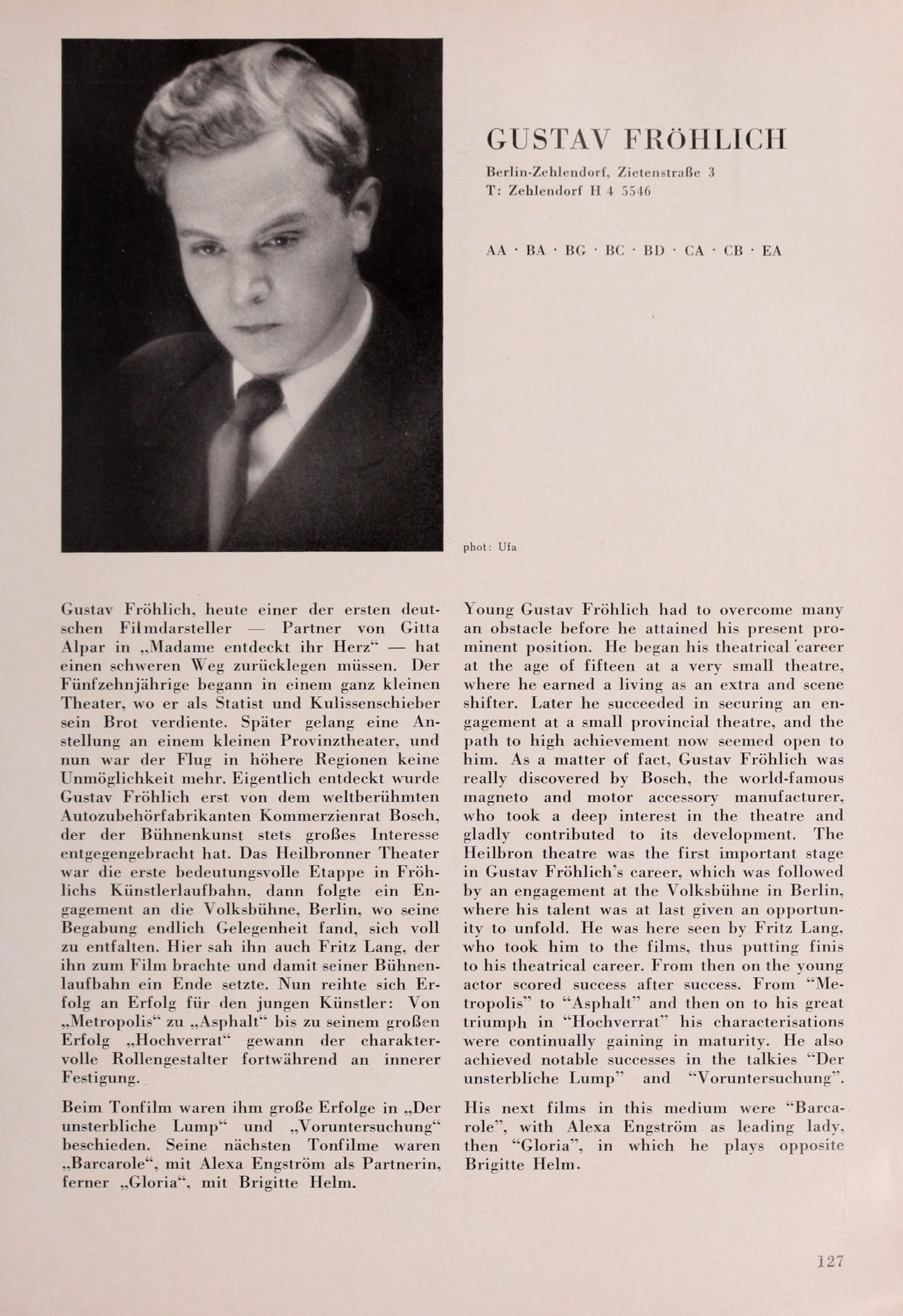Gustav Fröhlich (Universal Filmlexikon — 1932) 🇩🇪 🇬🇧

Young Gustav Fröhlich had to overcome many an obstacle before he attained his present prominent position. He began his theatrical career at the age of fifteen at a very small theatre, where he earned a living as an extra and scene shifter. Later he succeeded in securing an engagement at a small provincial theatre, and the path to high achievement now seemed open to him. As a matter of fact, Gustav Fröhlich was really discovered by Bosch, the world-famous magneto and motor accessory manufacturer, who took a deep interest in the theatre and gladly contributed to its development. The Heilbronn theatre was the first important stage in Gustav Fröhlich’s career, which was followed by an engagement at the Volksbühne in Berlin, where his talent was at last given an opportunity to unfold. He was here seen by Fritz Lang, who took him to the films, thus putting finis to his theatrical career. From then on the young actor scored success after success. From “Metropolis” to “Asphalt” and then on to his great triumph in “Hochverrat” his characterisations were continually gaining in maturity. He also achieved notable successes in the talkies “Der unsterbliche Lump” and “Voruntersuchung”.
His next films in this medium were “Barcarole”, with Alexa Engström as leading lady, then “Gloria”, in which he plays opposite Brigitte Helm.
—
Gustav Fröhlich, heute einer der ersten deutschen Filmdarsteller — Partner von Gitta Alpar in „Madame entdeckt ihr Herz” — hat einen schweren Weg zurücklegen müssen. Der Fünfzehnjährige begann in einem ganz kleinen Theater, wo er als Statist und Kulissenschieber sein Brot verdiente. Später gelang eine Anstellung an einem kleinen Provinztheater, und nun war der Flug in höhere Regionen keine Unmöglichkeit mehr. Eigentlich entdeckt wurde Gustav Fröhlich erst von dem weltberühmten Autozubehörfabrikanten Kommerzienrat Bosch, der der Bühnenkunst stets großes Interesse entgegengebracht hat. Das Heilbronner Theater war die erste bedeutungsvolle Etappe in Fröhlichs Künstlerlaufbahn, dann folgte ein Engagement an die Volksbühne, Berlin, wo seine Begabung endlich Gelegenheit fand, sich voll zu entfalten. Hier sah ihn auch Fritz Lang, der ihn zum Film brachte und damit seiner Bühnenlaufbahn ein Ende setzte. Nun reihte sich Erfolg an Erfolg für den jungen Künstler: Von „Metropolis” zu „Asphalt” bis zu seinem großen Erfolg „Hochverrat” gewann der charaktervolle Rollengestalter fortwährend an innerer Festigung.
Beim Tonfilm waren ihm große Erfolge in „Der unsterbliche Lump” und „Voruntersuchung” beschieden. Seine nächsten Tonfilme waren „Barcarole”, mit Alexa Engström als Partnerin, ferner „Gloria”, mit Brigitte Helm.

Berlin-Zehlendorf, Zietenstraße 3 • T: Zehlendorf H 4 5546
AA • HA • BG • BC • BD • CA • CB • EA
phot: Ufa
Gustav Fröhlich (1902–1987)
Collection: Universal Filmlexikon — 1932
